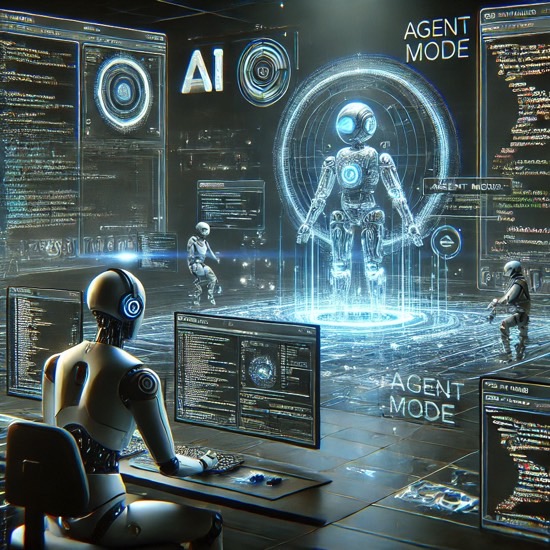GitHub Copilot and The Future of Autonomous Coding

TL;DR:
GitHub Copilot's agent mode and Project Padawan are pushing AI from assistant to autonomous peer, reshaping software development. This article breaks down these innovations, compares them to rivals like Replit and Cursor, and explores the implications for developers and organizations.
Introduction:
AI isn't just assisting developers anymore—it's coding alongside them. GitHub Copilot's new "agent mode" and Project Padawan are ushering in an era where AI isn't just a tool but a teammate. In this post, we'll dive into how these innovations are transforming software development and see how GitHub stacks up against competitors like Replit, Cursor, and Bolt. Ready to see what the future of coding looks like? Let's get into it.
The Evolution of GitHub Copilot: From Helper to Peer
When GitHub Copilot launched in 2021, it was a game-changer, offering real-time code suggestions and completions. Fast-forward to 2025, and it’s no longer just your coding buddy—it’s your autonomous peer, handling complex tasks with minimal oversight.
Key Milestones:
- 2021: Debut as a pair programming assistant powered by OpenAI's Codex.
- 2022: General availability with deeper workflow integration.
- 2024: Multi-LLM support with models like Claude, Gemini 1.5, and GPT-4o.
- 2025: Introduction of agent mode and Project Padawan, signaling the dawn of autonomous coding.
GitHub’s transition from pair programming to peer programming marks a broader shift in AI’s role—from helper to collaborator.
Breaking Down GitHub Copilot’s Agent Mode: Beyond Code Suggestions
Agent mode is more than just fancy autocomplete. It lets Copilot analyze, iterate, and self-correct across entire codebases, taking on tasks that once needed human intervention.
How Agent Mode Works:
- Task Understanding & Planning:
- Analyzes prompts to uncover hidden subtasks.
- Example: Ask Copilot to "optimize API response time," and it might automatically refactor database queries and implement caching.
- Iterative Execution:
- Writes code, tests it, and refines until it meets the criteria.
- Integrates with debugging tools to catch and fix runtime errors.
- Self-Healing Capabilities:
- Spots logical flaws or inefficiencies and fixes them.
- Can even run terminal commands, like installing dependencies, to resolve issues.
With agent mode, repetitive tasks are handled by AI, freeing developers to focus on architecture and innovation.
Project Padawan: Fully Autonomous Coding Agents Arrive
Project Padawan isn’t just a feature—it’s a vision. Named after Jedi apprentices, Padawan represents the next leap: AI as an independent contributor.
What Makes Padawan Revolutionary?
- End-to-End Task Handling: Assign it a task (like "Build a user authentication module") and Padawan will:
- Create repositories.
- Write, test, and refactor code.
- Open pull requests for human review.
- Context-Aware Development: It follows organizational coding standards, uses the right libraries, and respects architecture guidelines.
- Scalability: Integrates with enterprise CI/CD pipelines, making large-scale automation possible.
GitHub CEO Thomas Dohmke even hinted at AI agents joining team standups and sprint planning. Imagine that!
Competitive Landscape: How GitHub Stacks Up Against Rivals
GitHub may have pioneered AI-assisted coding, but the competition is heating up. Let’s see how it fares against Replit, Cursor, and Bolt.
Replit: Cloud-Native Agility
- Strengths:
- Mobile app integration for coding anywhere.
- AI-driven prompt tuning for better code generation.
- Weakness: Limited offline capabilities.
Cursor: Desktop Power for Professionals
- Strengths:
- Deep IDE integration with robust debugging and version control.
- Advanced codebase navigation using embeddings.
- Weakness: Requires local installation, which can be a hurdle for beginners.
Bolt: Simplifying Development for Beginners
- Strengths:
- User-friendly web interface for rapid prototyping.
- Collaborative workspace tailored for non-technical users.
- Weakness: Not ideal for complex, large-scale projects.
GitHub’s Edge:
- Enterprise Integration: Seamless alignment with GitHub’s ecosystem (Actions, Issues, Codespaces).
- Multi-LLM Support: Choose from models like Gemini 2.0 Flash and OpenAI’s o3-mini for specialized tasks.
Implications for Developers and Organizations
The rise of agentic AI tools isn’t just about speeding up coding—it’s reshaping the entire development process.
- Shifting Skill Sets: Developers will move from hands-on coding to:
- Defining high-level problem statements.
- Overseeing AI outputs for ethical and logical accuracy.
- Accelerated Development Cycles: Prototyping speeds up 3–5x, demanding robust CI/CD pipelines to handle the increased output.
- Ethical and Security Challenges:
- Bias Mitigation: Ensure AI-generated code aligns with organizational ethics.
- Compliance Risks: Keep AI in check with data privacy standards like GDPR.
The Future of Agentic AI in Coding
GitHub’s innovations point toward a future where AI isn’t just a tool—it’s a teammate. But challenges remain:
- Context Limitations: Can AI understand nuanced business logic without excessive prompting?
- Human-AI Collaboration: Striking the right balance between autonomy and transparency is key to maintaining trust.
As Project Padawan evolves, expect multi-modal AI (like vision models for UI design) and cross-platform orchestration (managing cloud, IoT, and edge deployments) to become the norm.
Conclusion: Embracing the AI-Driven Development Era
GitHub Copilot’s agent mode and Project Padawan aren’t just updates—they’re the future of coding. While competitors like Replit and Cursor are pushing boundaries, GitHub’s deep enterprise integration gives it a distinct edge.
For developers, staying ahead means:
- Mastering prompt engineering.
- Adopting AI tools that fit team workflows.
- Keeping up with AI ethics and oversight.
The race for autonomous coding dominance is on. Those who embrace the synergy between human creativity and AI efficiency will lead the way.